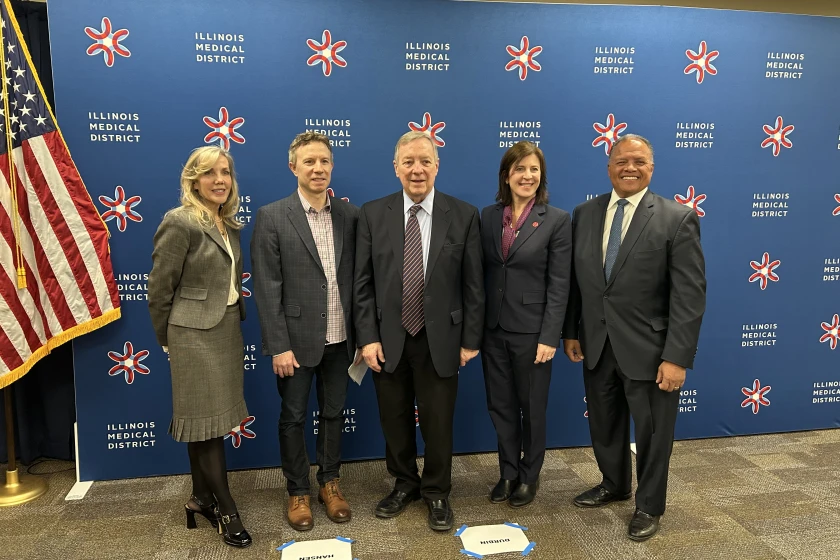NIH funding cuts could have ‘devastating impact’ on medical advancements, Chicago researchers say
Chicago Sun-Times Heading link

Dr. Rachel Caskey has dedicated her career to finding ways to improve maternal child health, but a halt in federal funding could threaten years of research.
“Our UIC Maternal Health Research Center of Excellence is using NIH funding to eliminate maternal morbidity and mortality and promote maternal health equity across Illinois,” said Caskey, professor and head of the Department of Medicine at University of Illinois Chicago. “The impact of this Center of Excellence will improve the lives of women and children in communities across our city, state and, we hope, the country.”
Caskey joined other researchers and U.S. Sen. Dick Durbin, D-Ill., at a news conference Monday at the Illinois Medical District to discuss the impact that cuts in research funding from the National Institutes of Health could have on medical institutions across the state.
In the 2024 fiscal year, UIC received more than 1,000 NIH-funded awards. With expenditures of $200 million, $63 million were indirect costs, Caskey said.
The NIH, under President Donald Trump, announced this month that it was cutting payments toward overhead costs for research institutions that receive its grants. The new policy would cap “indirect costs” of research at 15%, and could leave universities with major budget gaps. Hundreds of medical centers and universities have long relied on such reimbursements at rates of 60% or more for such expenses as facility maintenance, conducting studies and paying utilities.
“The proposed cap would cut indirect cost recovery by more than 70% at the University of Illinois Chicago, which could have devastating impact on our ability to conduct lifesaving research,” Caskey said.
Last week, Illinois Attorney General Kwame Raoul, along with 21 other Democratic attorneys general, announced a lawsuit to block the Trump administration from cutting off funding.
The NIH is under “political attack,” but medical research is critical for finding cures to diseases and saving lives, said Dr. Scott Andre Oakes, professor of pathology and vice dean for clinical science research at the University of Chicago.
“We need to remember that diseases are purple and medical research is purple,” Oakes said, referring to health research being a nonpartisan issue. “All Americans are susceptible to disease, and all of us benefit from the new treatments that come from the research supported by the NIH. Withdrawing or decreasing funding for the NIH will stall our collective efforts to find new cures and leave patients without hope.”
At Rush University there are more than 270 active clinical trials underway, but the proposed cuts could limit researchers’ ability to make medical advancements, said Dr. Robert Higgins, president and chief academic officer at the university.
“While we seem like this is an exercise in trimming the fat from a fiscal standpoint, at the national level, it is in fact cutting into our ability to advance treatments, to developing new therapies and pharmaceuticals that ultimately will help us understand diseases and save lives,” Higgins said. “It will eliminate that hope that our patients need and deserve.”
For now, universities and medical institutions are able to continue their work, but the threat remains.
“As of today, the message has been operations as usual, but we’re all watching, of course, quite anxiously to see where this might head,” Caskey said. “Researchers, clinicians and patients are extremely anxious. We’re getting questions across the board, and it’s trickling down to patients asking, particularly those who may have participated in a clinical trial or a family member has, and now they’re concerned, will this finish? What could happen?”
Research is able to continue because of the lawsuit blocking the policy from going into effect, Durbin said.
“This is being fought in courts, and that’s why there may be a temporary reprieve. I hope it goes beyond temporary, but this research should not be interrupted,” he said.
Source: Chicago Sun-Times